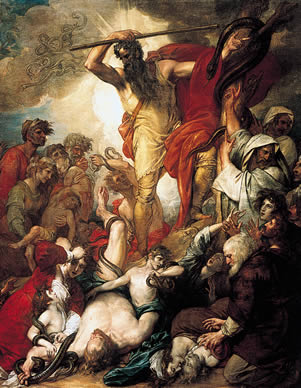
“Moses lifts up the brass serpent. . .”
On the readings for June 15 – Part I noted that “June 15 is the First Sunday after Pentecost, also known as Trinity Sunday,” and that the readings are Genesis 1:1-2:4a, Psalm 8, Second Corinthians 13:11-13, and Matthew 28:16-20.
The post said June 15 honors “the Trinity” – God in three persons – an idea that even a smart guy like Thomas Jefferson didn’t understand. The post added, “Another thing that’s hard for many people to understand is that the ‘Creation Story’ found at the beginning of the book of Genesis must be taken as literally true, or else you go to hell.”
The post theorized that in writing his Creation Story, Moses had to use “language and concepts that his relatively-pea-brained contemporary audience could understand.” Moses’ ability to get his point across was limited by his audience’s limited powers of comprehension, the same problem God has in talking to us. (And it doesn’t help if you think you’re a “know it all.”)
Which is why you read the Bible: to expand your ability to comprehend the points God may be trying to get across to you. One good way to expand your ability is to see how others in the past expanded their ability to comprehend God.
Which brings us back to the readings for June 15.
As noted, in Genesis 1:1-2:4a, Moses told the story of the creation of the world and the history of that world, with a special emphasis on events impacting how the Hebrew people came to be wandering in the wilderness, after what seemed like a miraculous escape from slavery in Egypt. (But even then some people were prone to complain about “the good old days,” and ask why things had to change. See for example Numbers 14:2-3, and 21:4-5, below.)
A note here: Possibly because the Genesis reading was so long, the second reading and Gospel are extremely short. And by the way, to see the full readings check The Lectionary Page.
The International Bible Commentary characterized Psalm 8 as emphasizing “Man’s Place in God’s World.” The psalm begins and ends with the phrase: “O LORD our Governor, how exalted is your Name in all the world!” And verse 2 – “Out of the mouths of infants” – was of special interest to Jesus, as noted in Matthew 21:14-16:
14 The blind and the lame came to him in the temple, and he cured them. 15 But when the chief priests and the scribes saw the amazing things that he did, and heard the children crying out in the temple, “Hosanna to the Son of David,” they became angry 16 and said to him, “Do you hear what these are saying?” Jesus said to them, “Yes; have you never read, ‘Out of the mouths of infants and nursing babies you have prepared praise for yourself’?”
Moving along, in 2 Corinthians 13:11-13, the Apostle Paul gave his “Farewell and Benediction,” ending his second letter to the church he founded in Corinth. In the letter he offered a “polemic defense of his apostleship,” which was being attacked by some, while affirming his affection for the church. (See Second Epistle to the Corinthians – Wikipedia, the free …)
Finally, Matthew 28:16-20, told of The Great Commission, “the instruction of the resurrected Jesus Christ to his disciples that they spread his teachings to all the nations of the world:”
The eleven disciples went to Galilee. . . And Jesus came and said to them, “All authority in heaven and on earth has been given to me. Go therefore and make disciples of all nations, baptizing them in the name of the Father and of the Son and of the Holy Spirit, and teaching them to obey everything that I have commanded you. And remember, I am with you always, [even] to the end of the age.”

The upper image is courtesy of Moses – Wikipedia, the free encyclopedia. The full caption reads: “Moses lifts up the brass serpent, curing the Israelites from poisonous snake bites in a painting by Benjamin West.” As to some Hebrews whining about “the good old days,” see:
Numbers 14:2-3, “All the sons of Israel grumbled against Moses and Aaron; and the whole congregation said to them, ‘Would that we had died in the land of Egypt! Or would that we had died in this wilderness! Why is the LORD bringing us into this land, to fall by the sword? Our wives and our little ones will become plunder; would it not be better for us to return to Egypt?'”
Numbers 21:4-5, “Then they set out from Mount Hor by the way of the Red Sea, to go around the land of Edom; and the people became impatient because of the journey. The people spoke against God and Moses, ‘Why have you brought us up out of Egypt to die in the wilderness? For there is no food and no water, and we loathe this miserable food.'”
And incidentally, that complaining led God to punish the whiners: “Frustrated and impatient, they complained against Yahweh and Moses (Num. 21:4-5)[,] and God sent ‘fiery serpents’ among them. For the sake of repentant ones, Moses was instructed by God to build a ‘serpent of bronze’ that was used to heal those who looked upon it.” That “serpent of bronze” was the prototype of the Caduceus, symbol of today’s medical profession.
The lower image is courtesy of Great Commission – Wikipedia, the free encyclopedia.